International Cronology of
Transnational Radical Party: 1999
4 January
Senegal - International Criminal Court
Senegal is the first country in the world to ratify the
Rome Statute of the International Criminal Court.
15 January
Italy: Rome - Albania, Immigration
A demonstration is held outside Palazzo Chigi (seat of
the Chamber of Deputies) while Albanian Premier Pandeli Majko (a member
of the Radical Party) meets with Italian Prime Minister Massimo D'Alema
during an official visit to Rome.
Protesters hold up placards with slogans such as: "Welcome Majko"; "D'Alema,
Propose Governing Immigration with the Albanian Government"; "A Flood
of 200,000 Immigrants a Year from Albania".
16 January
Russia: Moscow - Antimilitarism
The ARA (Associazione Radicale Antimilitarista) holds
its Congress in the Russian capital. The final motion gives top priority
to abrogating compulsory military service in Russia and making the transition
to a voluntary professional army. The Congress expresses its support
for the many young Russians who have declared themselves conscientious
objectors.
27 January
EP: Brussels - China
During a debate on the Bernard-Reymond report for a "comprehensive
partnership" between the EU and China, Olivier Dupuis points out that
the EU policy of establishing a "constructive dialogue" with China has
failed, and deplores the hypocrisy of "listening to dissidents when
they leave prison, applauding them, but forgetting that tens of thousands
of other political prisoners (...) are forced to exist in conditions
where torture, violence and, very often, death prevail": Dupuis calls
on the EU to refrain from establishing "privileged links" with China,
and to encourage businesses in Member States to invest in India, the
largest democracy in the world.
29 January
Italy: Rome - Antimilitarism
The Radical Party organises the Conference "Leva la leva"
on the abolition of compulsory military and civilian service.
Speakers include: Olivier Dupuis, the defence chief of the National
Alliance party General Luigi Ramponi, General Luigi Caligaris, and economists
Pietro Armani and Mario Baldassarri.
February
Russia: Moscow - Death Penalty
The 3-year deadline that the Russian Federation agreed
to respect when it signed the Sixth Optional Protocol to the European
Convention on Human Rights concerning the abolition of the death penalty
is about to fall due, and every Wednesday and Friday (the days on which
plenary sessions are held) Radical Party militants "picket" the entrance
to the Duma to make the countdown.
Slogan: "Death Penalty or Council of Europe?"
1 February
Holland: The Hague - Incrimination of Milosevic
A delegation from the Radical Party, led by Olivier Dupuis
and composed of Marino Busdachin, Paolo Pietrosanti, Mariano Giustino,
Afrim Gjonbalaj and Paolo Atzori presents to the Deputy Prosecutor of
the International Criminal Tribunal for the Former Yugoslavia Graham
Blewitt over 100,000 signatures of citizens and personalities from the
world of culture and of politics, asking that Yugoslav President Slobodan
Milosevic be incriminated immediately for warcrimes and crimes against
humanity.
Signatories include: Italian Interior Minister Rosa Russo Jervolino,
Albanian Premier Pandeli Majko, former prime ministers Michel Rocard,
Wilfried Martens and Leo Tindemans, MEPs Otto Von Habsburg, Antoinette
Spaak, Nobel Prize-winner John Polany, Isabelle Adjani, Bianca Jagger,
André Glucksmann, Nino Manfredi, Milva, Vladimir Bukovskij, Ismail Kadare.
18 February
France: Rambouillet - Incrimination of Milosevic
MEPs Olivier Dupuis and Gianfranco Dell'Alba, members
of the Transnational Radical Party, present the European Union's special
representative Wolfgang Petric with a report written by a group of legal
experts from the Radical association "No Peace Without Justice" on the
establishment of criminal and political responsibility for the warcrimes
and crimes against humanity committed in Kosovo in 1998. The report
- the result of a study carried out in the field between October and
November 1998, and based on interviews with journalists, members of
local and international NGOs and representatives from various diplomatic
missions in Kosovo - demonstrates that the Criminal Tribunal for the
Former Yugoslavia has complete jurisdiction over the crimes perpetrated
in Kosovo, and affirms the need to guarantee the Prosecutor of the Tribunal
free access to sites and witnesses within and outside the region.
March - April
UN: Geneva - Human Rights
The Radical Party speaks on several issues at the UN Commission
of Human Rights in Geneva, including: the rights of Gypsies, affirming
that they are a de facto nation numbering ten million in Europe alone;
the repression of political dissidents in China (speaker: Wei Jingsheng);
the repression of the democratic opposition in Tunisia; the violation
of the rights of women in Afghanistan and the rights of the indigenous
peoples of West Papua.
3 March
EU: Death Penalty
The Radical Party launches a campaign during which postcards
are sent to the President of the European Union Joschka Fischer, asking
him to undertake all the initiatives necessary to persuade the Fifteen
to place on the agenda of the next UN General Assembly the question
of a global moratorium on executions.
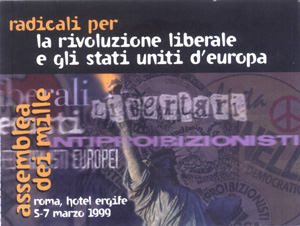 5-7
March
5-7
March
Italy: Rome - European Federalism
The Italian Radicals convene an Assembly of the Thousand
[a reference to Garibaldi's Thousand], for a liberal revolution and
a United States of Europe.
15 March
EU- Macedonia
The Radical Party launches an appeal to Macedonian Prime
Minister Georgievski, asking him to present a formal request for Macedonia's
urgent admission to the European Union, and suggesting he ignore Europe's
reticence in this regard, since it is as devoid of any legal foundation
as it is significant of the absence of any real political Union strategy
in the region.
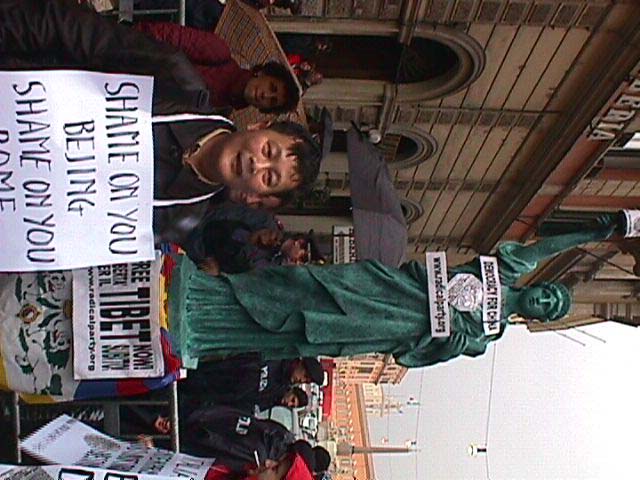 22
March
22
March
Italy: Rome - China
During Jiang Zemin's official visit to Italy, the Radical
party stages a protest outside the Quirinal while the leader of the
Chinese dictatorship is meeting with Italian President Scalfaro, and
in front of Palazzo Chigi (the seat of the Chamber of Deputies) while
he is having talks with Prime Minister D'Alema. Chinese dissident Wei
Jingsheng is among the demonstrators. Slogans: "Shame on You Jiang Zemin,
Shame on You Italy and Europe", Invest in India, Taiwan and South Korea,
Not China".
23 March
Italy : Rome - China, Information
A number of Radical activists, including Marco Cappato,
Rita Bernardini and Paolo Pietrosanti, occupy the offices of the Rome
daily Il Messaggero wearing gags, to protest against the fact that the
newspaper deliberately omitted to mention the Radical Party by name
when reporting on the demonstrations and press conferences held with
regard to Jiang Zemin's official visit to Italy.
25 March
UN: Geneva - Kosovo
At the March Session of the UN Commission on Human Rights
the Radical Party declares its support for NATO military intervention
in Kosovo.
25 March
Italy: Monastier (Treviso) - European Federalism
The final document of the second Assembly of the Thousand
held by the Italian Radicals indicates that a process should be set
in motion to create a new political force for a liberal revolution and
a United States of Europe, and deals, among other things, with the campaign
for the next European elections.
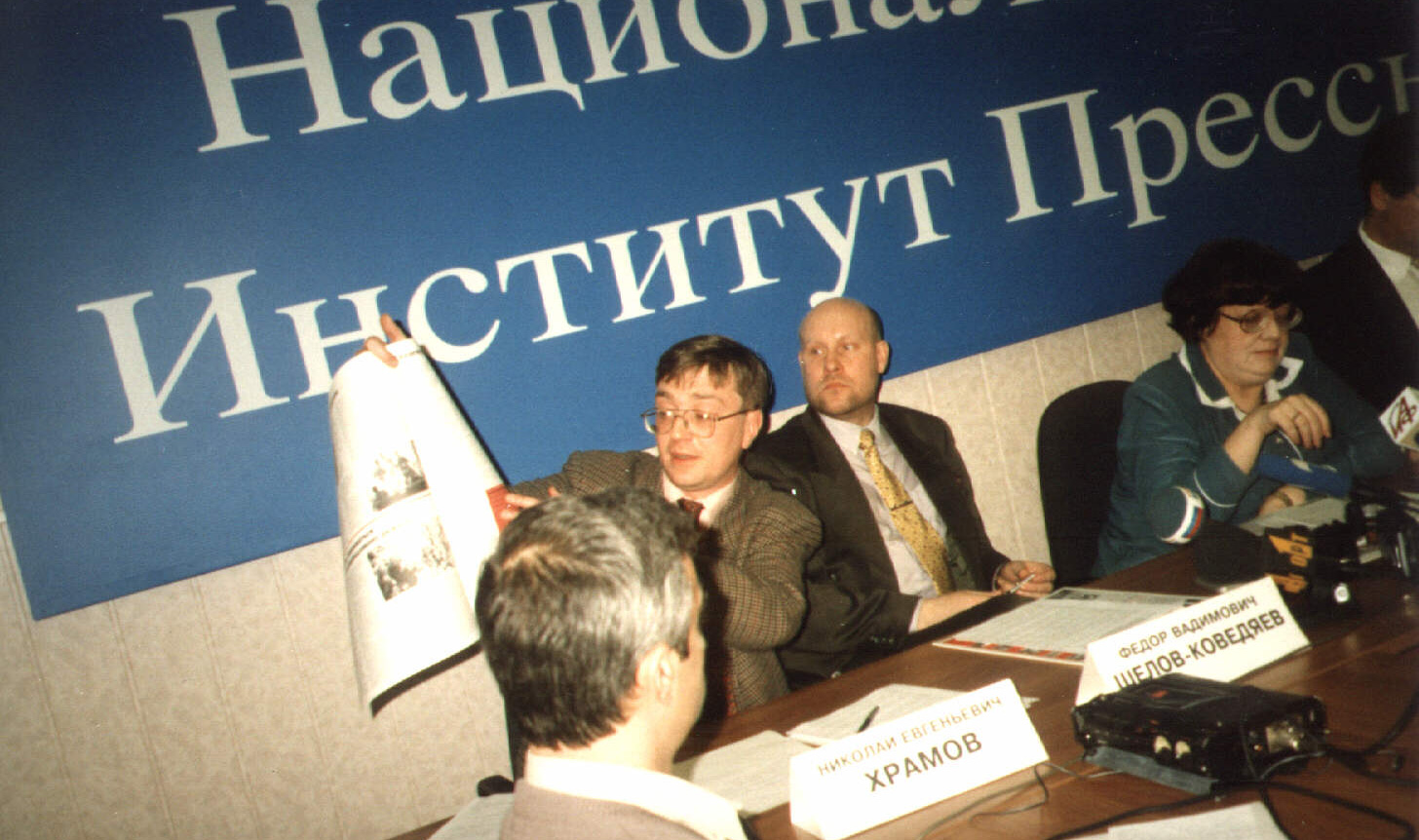 1
April
1
April
Russia: Moscow - Hunger Strike
Konstantin Borovoj, a member of the Duma with the Independents
and board member of the ARA (Associazione Radicale Antimilitarista),
who favours continued NATO military intervention in Kosovo, begins a
hunger strike to protest mainly against "the widespread disinformation
regarding the real situation in Yugoslavia and the war". He stops his
hunger strike on 4 April, when a broadcast by Itogi on the NTV channel
finally makes Russian citizens aware of the extent of the humanitarian
catastrophe in Kosovo.
6 April
Trinidad and Tobago - International Criminal Court
Trinidad and Tobago is the second country to ratify the
Rome Statute of the International Criminal Court.
15 April
EP: Brussels - Incrimination of Milosevic
The European Parliament finally agrees to endorse the
Tribunal in The Hague's proposal that Milosevic be incriminated for
warcrimes and crimes against humanity, after rejecting it several times.
However, the EP turned down - by only 6 votes - another proposal made
by European Commissioner Emma Bonino, advocating the "immediate creation
of humanitarian corridors with military protection" to facilitate the
consignment of aid to Kosovar refugees.
22 April
Italy - Incrimination of Milosevic
Dozens of Radicals go on a 3-day hunger strike to obtain
from Prime Minister D'Alema and Foreign Minister Dini the following:
"1. That the Italian Government immediately deliver to the Prosecutor
of the International Tribunal for crimes committed in the Former Yugoslavia
- as Tony Blair and Robin Cook have recently done - all the proof and
documents in its possession that would provide evidence of Slobodan
Milosevic's and the other Belgrade leaders' guilt;
2. That Milosevic be incriminated, which the Radicals have been calling
for since last August and 200,000 citizens have so far requested by
signing a petition;
3. That the Italian government engage itself to see that all necessary
measures be taken to ensure President Milosevic's safety, in order that
he might answer for his crimes before the Tribunal in The Hague;
4. That the Statute establishing the permanent International Criminal
Court to affirm the power and pre-eminence of the law be ratified immediately."
24 April
Kosovo - Incrimination of Milosevic
"No Peace Without Justice" and the Transnational Radical
Party send a mission to Albania - led by MEP Gianfranco Dell'Alba -
to assess the practical needs of co-ordination between humanitarian
agencies and non-governmental human rights organisations, to ensure
that the testimonies of the deportees are transmitted to the Criminal
Tribunal for the Former Yugoslavia.
24 April
Russia: Moscow - Antimilitarism
Activists from the Radical Party, the ARA (Associazione
Radicale Antimilitarista) and the Khramov Club - Association for Libertarian
Reforms, take part in a 20,000-strong antimilitarist march in the centre
of Moscow. The Radicals demonstrate beneath a flag bearing Gandhi's
image and hold up placards with the following slogans: "Liberal Revolution",
"No Military Service in the Third Millennium", "Accuse Milosevic Now",
"Defend our Serb Brothers against Milosevic's National Communist Regime".
29-30 April
EP: Brussels - Esperanto
The ERA (Associazione Radicale Esperanto) organises a
Conference entitled "Il Diritto alla lingua internazionale entro il
2020" ("The Right to an International Language by 2020") in which international
figures, such as Nobel Economics Prizewinner Reinhard Selten, experts
and Esperanto scholars participate.
A delegation led by Selten is received by the President of the European
Parliament, José Maria Gil-Robles.
30 April
Republic of San Marino - International Criminal Court
The Republic of San Marino is the third country to sign
the Rome Statute of the International Criminal Court.
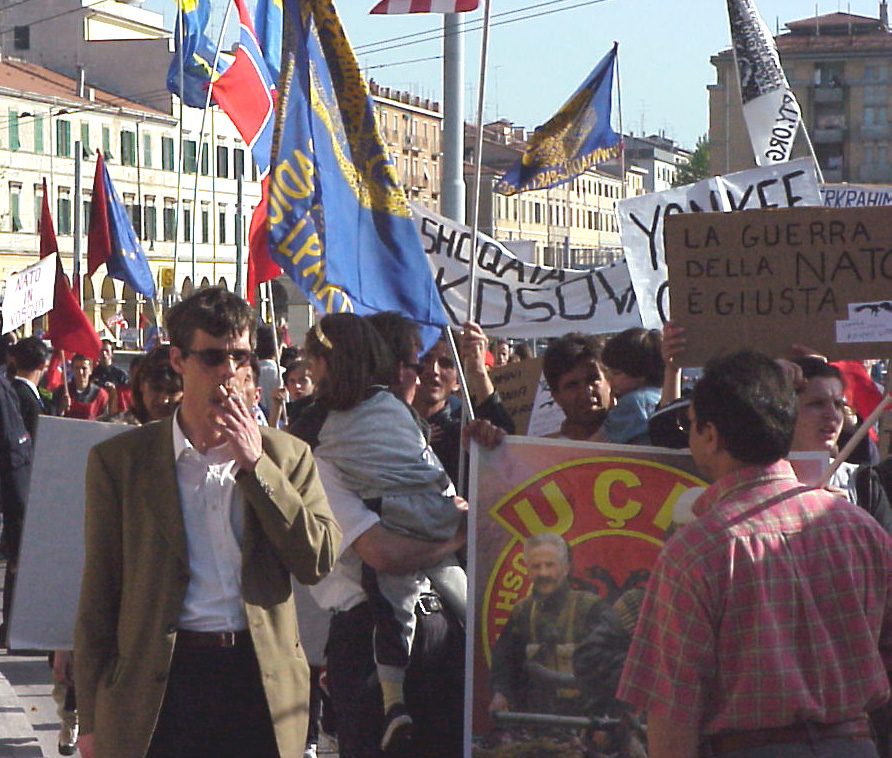 2
May
2
May
Italy: Ancona - Kosovo
A national demonstration - promoted by the Radical Party
and by the Kosovar community in Italy - is held to defend the freedom
and right to life of the Kosovar people, to support the international
campaign for the incrimination of Milosevic, and for democracy in Serbia.
Olivier Dupuis, Marco Cappato, Stefano Mazzocchi and Antonio Russo,
Radio Radicale's Pristina correspondent, are the speakers at the closing
meeting.
6 May
EP: Brussels - Incrimination of Milosevic
The European Parliament approves an amendment, presented
by the Radicals, to a resolution on Kosovo. Said amendment affirms that
"the mass deportations of hundred of thousands of Kosovars, not to mention
the many other acts of oppression, provide sufficient grounds - in conformation
with the Statute of the International Criminal Tribunal for the Former
Yugoslavia and more precisely in accordance with Arts. 2, 3, 4, 5, and
7 therein - for immediately indicting the highest political authorities
in Belgrade, starting with Slobodan Milosevic".
6 May
EP: Brussels - Albania, Kosovo
During the vote on the Spencer report on the "Development
of the PESC ? ? ? in 1998", the European Parliament adopts an amendment,
presented by Olivier Dupuis, in which "the EP congratulates the government
led by Albanian Prime Minister Pandeli Majko for the work it has done
so far, with regard to the stabilisation and pacification of Albania
and the welcome given to Kosovar deportees, and asks the Council and
the Commission to create a real Marshall Plan for Albania without delay,
and to start negotiations with a view to establishing an agreement of
association between the EU and Albania".
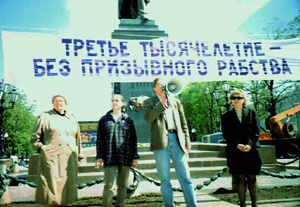 21
May
21
May
Russia - Antimilitarism
The Associazione Radicale Antimilitarista launches a campaign
for a petition entitled: "No Military Service in the Third Millennium".
The aim is to collect 50,000 signatures by January 2000, on this petition
is addressed to the Duma which calls for the abolition of compulsory
military service and the transition to a voluntary army.
7 May
EP: Brussels - Death Penalty
The European Parliament unanimously adopts an emergency
resolution calling upon the European Union to promote, at the next UN
General Assembly, a resolution for the introduction of a global moratorium
on executions.
27 May
Holland: The Hague - Incrimination of Milosevic
The Chief Prosecutor of the International Tribunal for
the Former Yugoslavia, Louise Arbour, makes public the charges against
Slobodan Milosevic, President of the Yugoslav Federation, and the following
leaders of the Belgrade regime: Milan Milutinovic, Nikola Sainovic,
Dragoljub Ojdanic and Vlayko Stoyilovic. They are accused of crimes
against humanity and violations of international humanitarian law. This
is a victory for the Radicals and for the thousands of citizens that
for months have campaigned to obtain this official indictment.
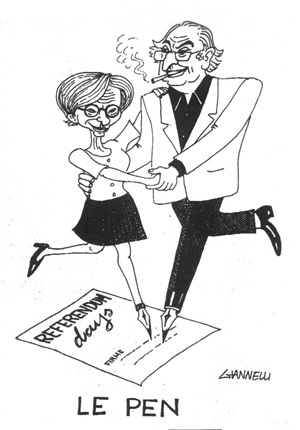 June
June
EP: Brussels - TDI Group
Unable to form a "European Federalist Group", the 7 newly-elected
MEPs on the Bonino List propose forming a "mixed group" open to all
MEPs who do not belong to a specific group. The initiative is undertaken
to avoid such MEPs being discriminated against, since they are in fact
excluded from parliamentary proceedings and denied a certain number
of administrative services. The initiative provokes violent criticism
- particularly from several members of the Jewish community (whose spokesman
is actually the Honorary President of the Radical Party, Bruno Zevi)
- and the Radicals are accused of wanting to form an alliance with parliamentarians
belonging to Le Pen's National Front. The Technical Group of Independent
Members (TDI), dissolved by the European Parliament on the recommendation
of the Constitutional Commission led by Giorgio Napolitano, was reinstated
by the Court of First Instance of the European Communities, which has
recognised that MEPs who do not belong to a particular group are subject
to serious forms of discrimination.
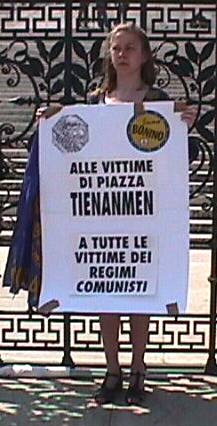 4
June
4
June
Italy - China, Human Rights
On the 10th Anniversary of the Tienanmen Square massacre,
Radicals lay flowers on monuments to resistance fighters and war victims,
in Italy's major cities.
In Rome, they hold a demonstration in front of the monument to Victor
Emmanuel II and the Tomb of the Unknown Soldier, then march to the Chinese
Embassy carrying a replica of the Statue of Liberty, symbol of the Chinese
student movement.
13 June
The Bonino List includes the creation of a United States
of Europe among the priority issues on its political programme and sees
7 of its members elected, winning 8.5% of the seats at the European
Parliamentary elections.
30 June
Italy - International Criminal Court
The Italian Chamber of Deputies passes legislation in
favour of Italy's ratification of the Statute of the International Criminal
Court.
22 July
Russia: Moscow - International Criminal Court
Radicals demonstrate outside the Russian Foreign Ministry,
calling upon Russia to ratify the Statute of the International Criminal
Court without delay.
31 July - 1 August
Italy: Rome - Congress
The Radical Party holds its Fifth Italian Congress.
12-18 August
UN: Geneva - Human Rights
During the work of the UN Sub-Commission on Prevention
of Discrimination and Protection of Minorities, the Radical Party expresses
its wholehearted approval of the Secretary-General's report on the violation
of the rights of women in Afghanistan; speaks on the issue of interethnic
coexistence in Macedonia and on the discrimination shown towards the
Albanians; and denounces the violation of the rights of indigenous peoples
in West Papua, as well as Chinese policy in Tibet, Inner Mongolia and
Eastern Turkestan, which threatens to cause either the complete disappearance
or the dispersal of the Tibetan, Uigur and Mongol peoples.
September
EP: Tunisia, Human Rights
The Radical Party proposes Khemais Ksila as a candidate
for the Sakharov Prize.
Vice-President of the Tunisian League for Human Rights and former trade
unionist, Khemais Ksila has been brutally persecuted - non-stop - by
the Tunisian authorities for many years.
September
Olivier Dupuis presents at the European Parliament a draft
resolution asking for the release of Kosovar political prisoners detained
in Serb prisons. (The report of the UN Commissioner for Human Rights
estimates that these prisoners are approximately 5,000.) The text also
calls on the UN Security Council to adopt a resolution that makes it
clearly understood to the Serb authorities that the peace process is
dependent upon the release of the political prisoners.
8 October
Russia: Moscow
Signatures are collected on a popular appeal to the Public
Prosecutor's Office requesting that it take legal action against the
Mayor of Moscow Luzhkov for abuse of power. Luzhkov has issued a provision
entitled "Concerning Urgent Measures to Guarantee the Correct Registration
of Citizens Staying in Moscow Temporarily", under which all citizens
who are not resident in Moscow are ordered to effect a "new registration"
- not provided for by law - while the police must "establish the reason
for the "temporary stay" of any citizen in Moscow. The military resorts
to violence, arms and the use of "special" methods in carrying out the
Mayor's orders.
12 October
Italy: Turin, Ivrea - Drugs
MEP Olivier Dupuis, elected on the Bonino List, visits
the prisons of Turin and Ivrea, accompanied by CORA (Coordinamento Radicale
Antiproibizionista) Secretary Giulio Manfredi.
The Radicals present a parliamentary question concerning the unequal
treatment of drug abusers outside and inside prison, seeing that, according
to government statistics, methadone is administered to only 43 drug
abusers out of 1238 in the whole of Piedmont while it was given to 42%
of SERT (Service for Drug Addicts) users in the region in 1997. CORA
sends a letter regarding the issue to Judge Giancarlo Caselli.
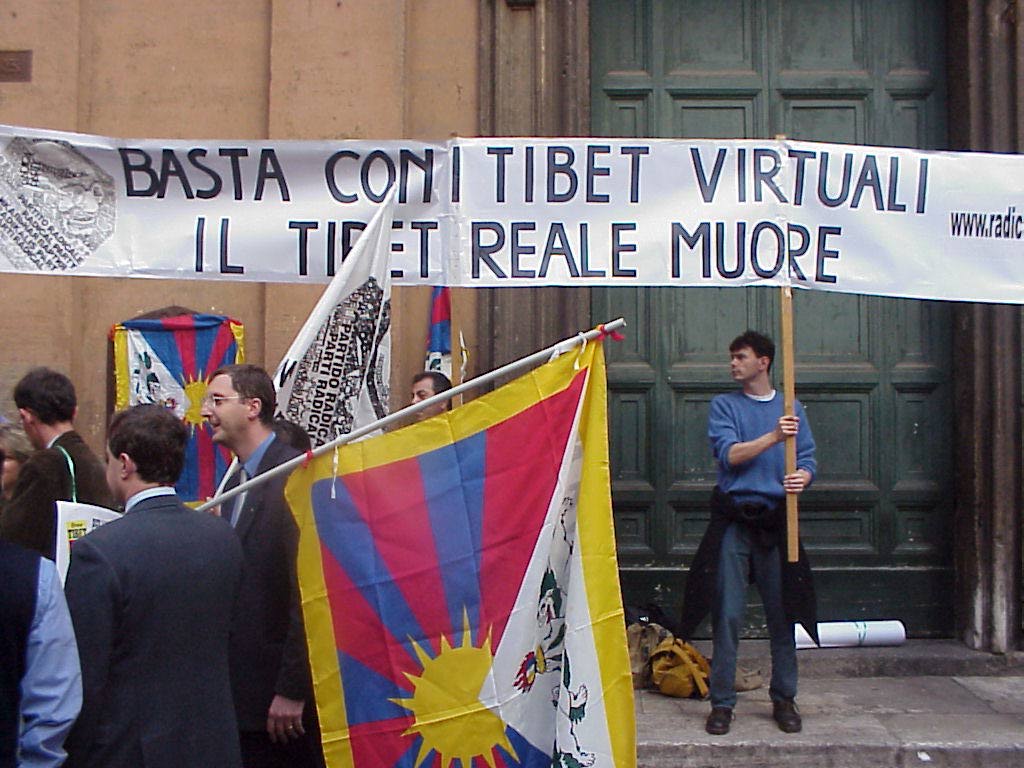 27
October
27
October
Italy: Rome - Tibet, Human Rights
The Radical Party demonstrates outside the Capranica cinema
during a public meeting with the Dalai Lama, to greet the Tibetan leader
and to denounce the hypocrisy of the United States, the European Union
and Italy, in supporting brutal regimes like the dictatorship in Communist
China while engaging in friendly chats with their victims.
15 November
UN: New York - Death Penalty
At the UN General Assembly, the EU Council of Ministers
decides not to ask that the resolution for a moratorium on executions
be put to the vote. For Emma Bonino this only confirms that "European
diplomats are prepared to sacrifice human rights on the altar of commercial
and geopolitical interests".
29 November
Fiji - International Criminal Court
The Republic of Fiji is the fifth country
to ratify the Statute of the International Criminal Court.
10 December
Russia: Moscow - Chechnya, Human Rights
Activists from the ARA and the Radical Party take part
in a big demonstration in Pushkin Square, organised by Valeria Novodvorskaja's
Democratic Union, against the second Chechen war, in an effort to save
the lives of the civilian population in the region.
16 December
EP: Brussels - International Criminal Court
The European Parliament unanimously approves an emergency
resolution on the International Criminal Court. It solemnly appeals
to the governments and parliaments of the 14 Member States to expedite
procedures for the ratification of the Statute of the International
Criminal Court, so that said Statute might become effective by the end
of 2000 (which requires at least 60 ratifications).
20 December
Ghana - International Criminal Court
Ghana is the sixth country to ratify the Statute of the
International Criminal Court.
December
Russia - Antimilitarism
The Radical Party denounces the fact that Dmitrij Neverovskij is sentenced to two years' imprisonment for having refused, as a conscientious objector, to do military service in Chechnya.